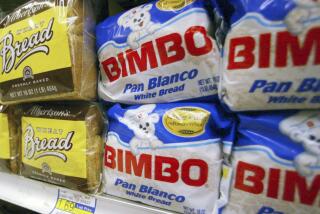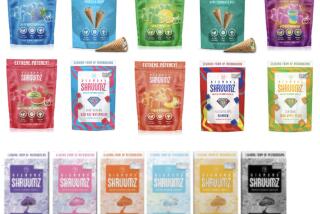FDA issues warnings on food labels
Reporting from Washington — In a crackdown on dubious claims on food packages, the Food and Drug Administration has sent warning letters to 17 producers for making what it said were misleading statements about nutrition and health benefits.
The agency also issued an industrywide challenge to upgrade the quality of nutrition labeling.
The warning letters apply to 22 products and challenge labeling language on such issues as fat content, nutrient standards and the purported ability of a particular food to prevent medical problems.
The clampdown was hailed as “a once in a generation event” by the Center for Science in the Public Interest. The nonprofit advocacy group recently released a report documenting purported labeling abuses, including several that earned FDA warning letters.
By coming down on mislabeling, the FDA is demonstrating that the food label is “an essential weapon in the toolbox in the fight against obesity and other diseases,” said Bruce Silverglade, CSPI’s director of legal affairs and a coauthor of the report.
Among the targets of the FDA action was a label for Mrs. Smith’s Coconut Custard Pie, produced by Schwan’s Consumer Brands North America of Bloomington, Minn. It advertised that the pie contained no trans fat, but did not disclose that it contained significant levels of saturated fat and total fat.
Similarly, Diamond Food of Stockton was cited for making claims that its shelled walnuts warded off maladies such as arthritis, cancer and heart disease. Foods generally are not permitted to make disease-fighting claims.
In addition to warning letters, FDA Commissioner Margaret Hamburg released a “Dear Industry” letter in which she invited food producers to collaborate on improving nutrition information, particularly on the front of food labels, where consumers are most likely to see it.
But Hamburg also warned food companies to toe the regulatory line, noting that “we continue to see products marketed with labeling that violates established labeling standards.” Companies that receive warning letters have 15 days to inform the agency of corrective action.
In a statement on its corporate website, Diamond Food said: “We expect to be able to make any changes required to our packaging and website expeditiously and with minimal expense.”
A Schwan’s spokesman could not be reached for comment.
Nutritionist Marion Nestle, a prominent critic of industry labeling practices, said the FDA probably was influenced by the CSPI report and by European Union regulators, who have taken a hard line against spurious health claims on food labels.
The FDA is “really encouraged to go out and do this when they see this stuff exposed,” Nestle said.
A draft of the CSPI critique had been circulating inside the FDA for several months before its release earlier this week.
The more aggressive enforcement reverses a relatively permissive stance on the content of food labels that had taken hold over the last 15 years, said Nestle, a professor at New York University.
The high-profile warnings continue a pattern of more rigorous regulatory action by the Obama administration, particularly at the Federal Trade Commission and the FDA, said Ivan Wasserman, a Washington attorney who represents food producers.
“There’s a new sheriff in town,” Wasserman said. “It’s tough to say how relevant this is to consumers. But this will have an effect. Responsible industries will spend some time making sure they’re in compliance.”
More to Read
Eat your way across L.A.
Get our weekly Tasting Notes newsletter for reviews, news and more.
You may occasionally receive promotional content from the Los Angeles Times.









